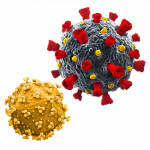Bacteria in the intestines of people living with HIV may perpetuate the body’s initial inflammatory immune response to the virus and account for various chronic diseases, which are disproportionate among the population even in the face of successful antiretroviral (ARV) treatment, according to findings published in Science Translational Medicine and reported by the San Francisco Business Times. Investigators studied the microbes living within seven HIV-positive participants not taking ARVs, 18 people with an undetectable viral load thanks to successful treatment and nine HIV-negative participants who were matched to the others in terms of similar health risks.
The researchers found that the population of microbes in the HIV-positive participants stood in stark contrast to that of their HIV-negative counterparts. Those living with HIV had more gut bacteria that can cause damaging inflammation, including Pseudomonas, Salmonella, E. coli and Staphylococcus.
There was a correlation between a disruption in the normal bacterial population of the human gut and levels of an inflammatory molecule in the blood known as IL-6, as well as to an enzyme by the name of indoleamine 2,3-dioxygenase. This enzyme can inhibit the gut’s role as a barrier, opening the gates for bacteria and other molecules to enter the body and cause more harmful inflammation. Furthermore, the researchers found higher levels in the HIV-positive participants of certain species of bacteria that are able to mimic this enzyme.
To read the San Francisco Business Times story, click here.
To read the study abstract, click here.
To read the release on the study, click here.
Advertisement
Advertisement
Advertisement






1 Comment
1 Comment